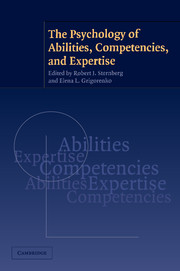Book contents
- Frontmatter
- Contents
- Preface
- List of Contributors
- The Psychology of Abilities, Competencies, and Expertise
- 1 Trait Complexes, Cognitive Investment, and Domain Knowledge
- 2 Intelligence as Adaptive Resource Development and Resource Allocation: A New Look Through the Lenses of SOC and Expertise
- 3 Developing Childhood Proclivities into Adult Competencies: The Overlooked Multiplier Effect
- 4 The Search for General Abilities and Basic Capacities: Theoretical Implications from the Modifiability and Complexity of Mechanisms Mediating Expert Performance
- 5 On Abilities and Domains
- 6 Expertise and Mental Disabilities: Bridging the Unbridgeable?
- 7 The Early Progress of Able Young Musicians
- 8 Expertise, Competence, and Creative Ability: The Perplexing Complexities
- 9 Biological Intelligence
- 10 What Causes Individual Differences in Cognitive Performance?
- Index
- References
4 - The Search for General Abilities and Basic Capacities: Theoretical Implications from the Modifiability and Complexity of Mechanisms Mediating Expert Performance
Published online by Cambridge University Press: 05 June 2012
- Frontmatter
- Contents
- Preface
- List of Contributors
- The Psychology of Abilities, Competencies, and Expertise
- 1 Trait Complexes, Cognitive Investment, and Domain Knowledge
- 2 Intelligence as Adaptive Resource Development and Resource Allocation: A New Look Through the Lenses of SOC and Expertise
- 3 Developing Childhood Proclivities into Adult Competencies: The Overlooked Multiplier Effect
- 4 The Search for General Abilities and Basic Capacities: Theoretical Implications from the Modifiability and Complexity of Mechanisms Mediating Expert Performance
- 5 On Abilities and Domains
- 6 Expertise and Mental Disabilities: Bridging the Unbridgeable?
- 7 The Early Progress of Able Young Musicians
- 8 Expertise, Competence, and Creative Ability: The Perplexing Complexities
- 9 Biological Intelligence
- 10 What Causes Individual Differences in Cognitive Performance?
- Index
- References
Summary
The search within the social sciences for stable, invariant, and quantifiable attributes of living organisms closely parallels historic investigations in the hard sciences in search of characteristics of physical phenomena. The revolutionary advances in physics in the sixteenth through eighteenth centuries allowed scientists to develop lawful relations between characteristics of objects such as weight, size, and velocity with their subsequent “behavior” (trajectories) under specified physical conditions (for example, collisions between objects). Similarly psychology, when it emerged as an independent science in the nineteenth century, approached its own quest to uncover laws of perception and memory under the guidance of pioneering scientists such as Hermann Ebbinghaus, with comparable scientific methods. Psychology's focus was not, however, on the characteristics of physical objects, but on the search for invariant processes and attributes of individuals that could be quantified and used to predict human behavior and achievement. These same theoretical frameworks were subsequently extended to describe individual differences in ability, and finally used to predict performance in schools and other everyday settings.
In this chapter I review the search for general ability and basic capacities. I begin by briefly sketching the history of the study of individual differences and the methods pioneering investigators employed to develop theoretical conceptions of ability and capacity. Most important, I discuss the historical arguments for the existence of ability and capacity, efforts to measure these quantities, and proposals for the biological mechanisms mediating the effects of ability and capacity on performance.
- Type
- Chapter
- Information
- The Psychology of Abilities, Competencies, and Expertise , pp. 93 - 125Publisher: Cambridge University PressPrint publication year: 2003
References
- 46
- Cited by

